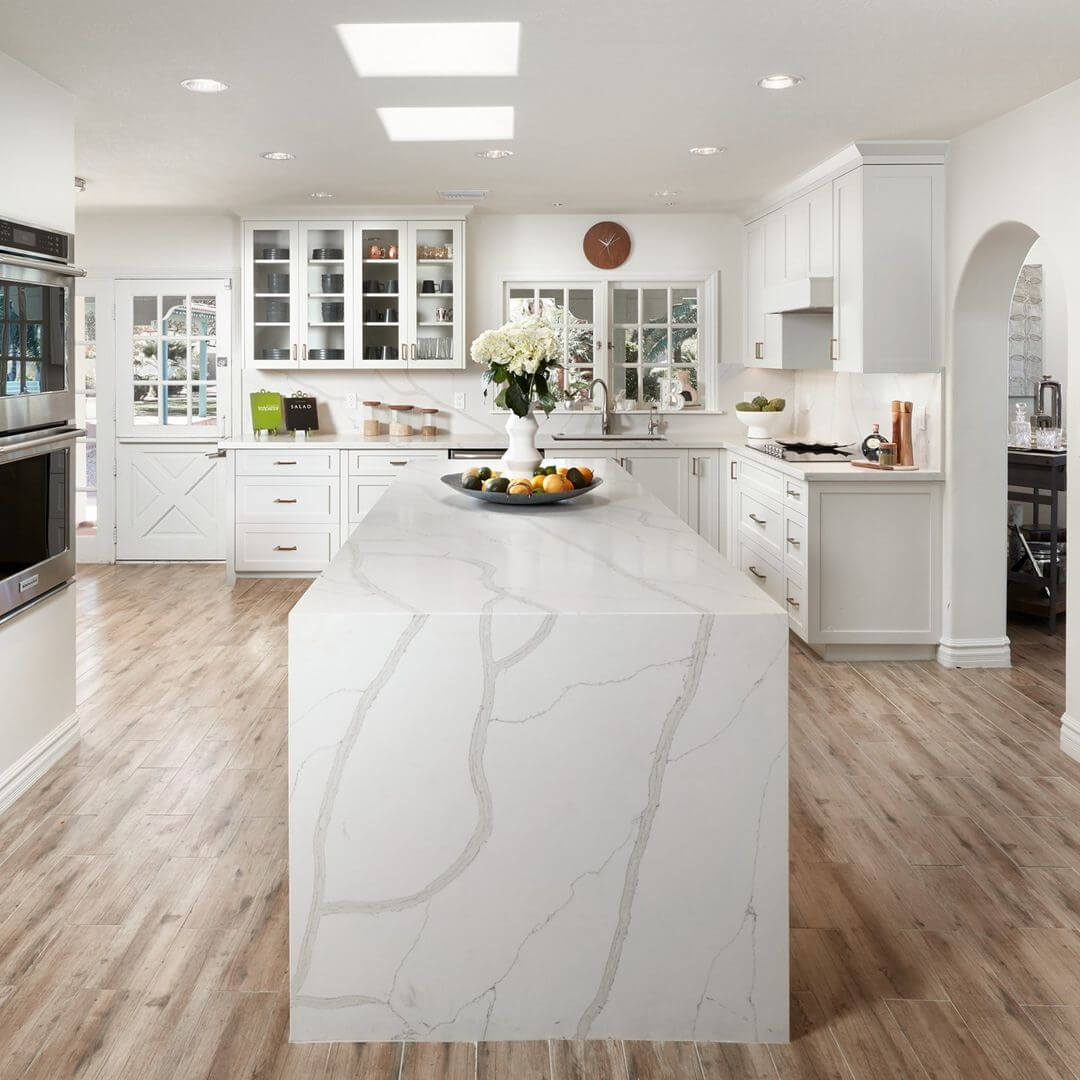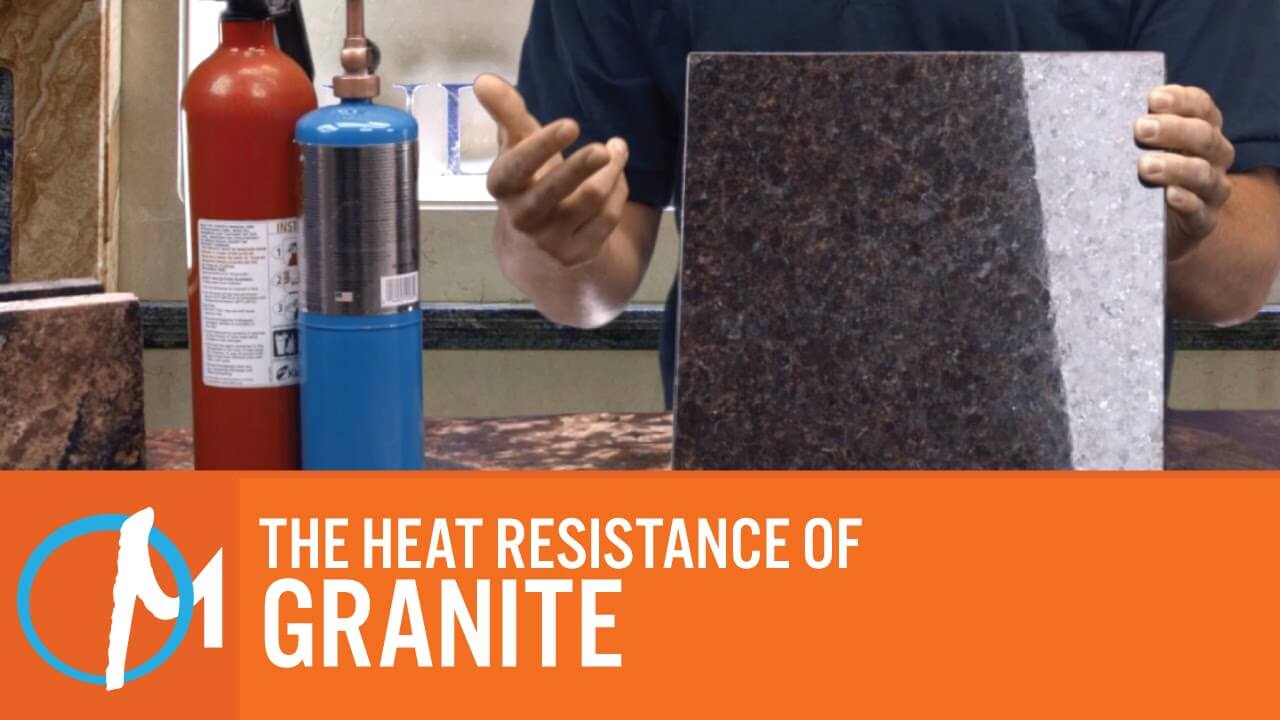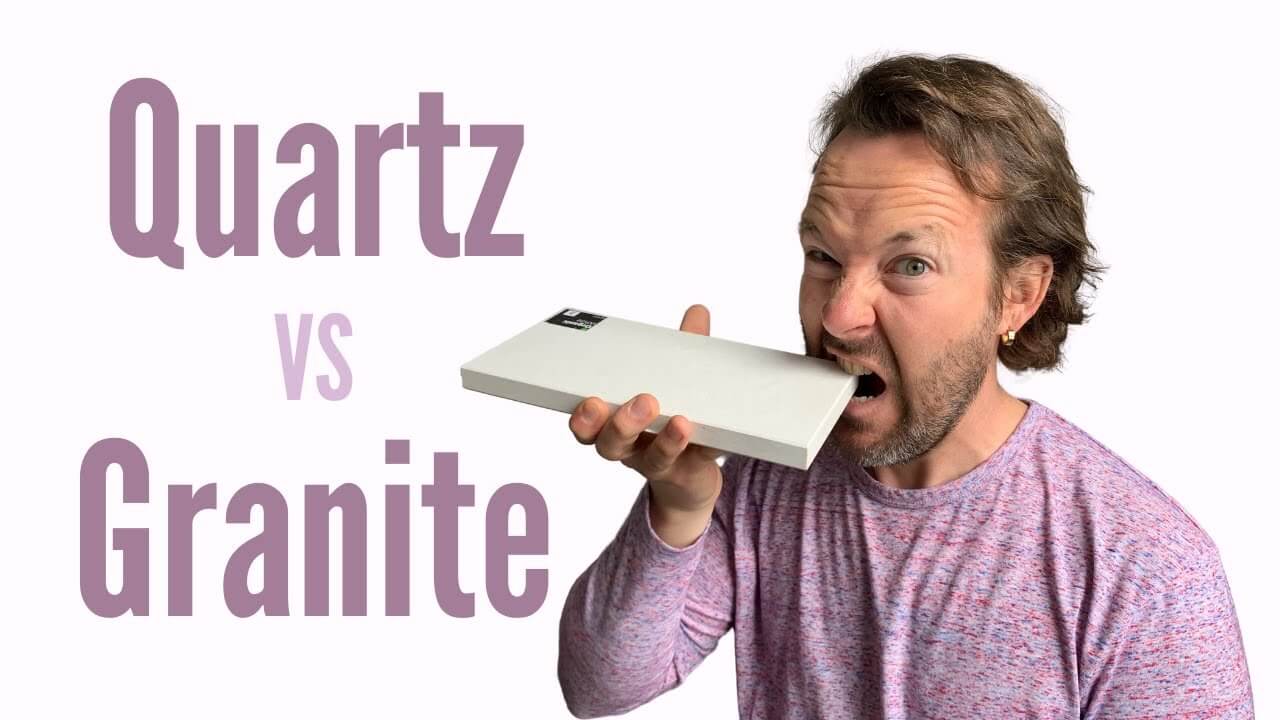Quartz vs Granite for kitchen Countertops
It’s a heavyweight battle: quartz vs granite for kitchen countertops. But which one is better for your home?
In a Nutshell:
Quartz countertops, engineered from quartz chips and resin, excel in stain resistance and offer a variety of colors and patterns, suitable for diverse interior designs. They are more uniform and affordable, yet less heat resistant. Granite countertops, carved from natural stone, are unique in pattern, highly heat and scratch-resistant, and add an elegant, timeless appeal. However, they require more maintenance due to their porous nature and can be more expensive. Your choice should balance aesthetic preferences, functionality, maintenance, and budget considerations for an ideal kitchen upgrade.
Which Is Better: Quartz or Granite Countertops?
Let’s cut to the chase. The best countertop material depends on your needs, preferences, and budget. Each option has a distinct set of advantages and drawbacks, meaning you won’t find cookie-cutter solutions.
- Granite countertops consist of a natural stone that holds up against scratches and heat. Since the material comes directly from quarries, installing a granite countertop reduces your carbon footprint. However, granite tends to have a somewhat porous surface, which makes it vulnerable to stains.
- Quartz countertops are engineered stone materials that manufacturers produce from natural quartz, in the form of quartz chips or dust, mixed with a resin binder. While the color and pattern are artificial, this man-made rock product has much better durability and stain resistance than a stone slab from nature. It can withstand coffee, wine, and oil spills without stains, so cleanup only takes a second.
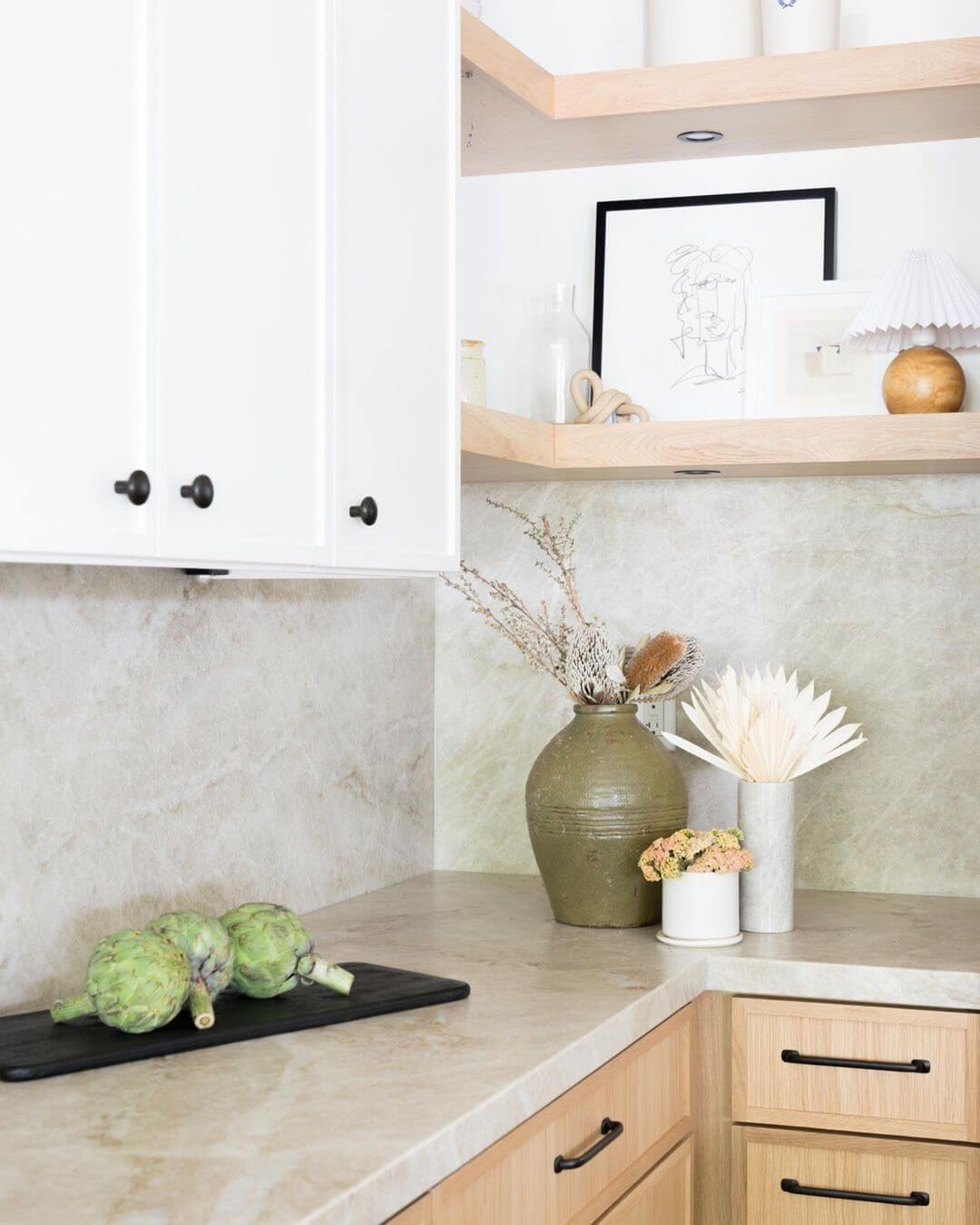
Quartz vs. Granite Countertops: Pros and Cons
Are you on the fence between quartz and granite countertops? Well then, let this comprehensive article provide the information to help you decide.
Here are the pros and cons of both materials when considering either countertop for your kitchen or bathroom.
Quartz Countertops – Pros
- Variety of Colors – When you buy granite, you’re limited to the colors that Mother Nature produces. Quartz comes from composite processing, which eliminates many aesthetic constraints. The only limits for patterns and color options are in your imagination.
- Stain Resistance – Quartz has a clear edge over granite in stain resistance. It has minute pores, making it challenging for liquids to invade the synthesized mineral. While quartz is stain-resistant, it’s not stain-proof. The resin can react with chemicals to leave lasting marks.
- Versatility – Quartz counters come in a variety of colors and patterns. You shouldn’t limit the engineered stone blend to your kitchen or bathroom, though. The visual diversity makes quartz a winning combination at the bar, fireplace, and other areas of your home.
- Affordability – As a rule of thumb, you can expect to pay around $50 to $65 per square foot of quartz compared to around $50 to $100 per square foot for granite countertops. High-grade quartz countertop material typically averages $65 to $75 per square foot. However, prices vary considerably.
Quartz Countertops – Cons
- Larger Carbon Footprint – Engineered stone countertops take a lot of time and energy to manufacture. The production process involves multiple toxic chemicals that release harmful emissions into the environment. Since granite is a natural material that requires no manufacturing process, it has a lower carbon footprint.
- Vulnerability to Heat – While quartz has remarkable durability, it’s not damage-proof. If you place a searing hot pan on the counter, it may ruin the surface. Experts disagree on how hot an appliance must be to cause damage. Estimates range from 150 to 300 degrees.
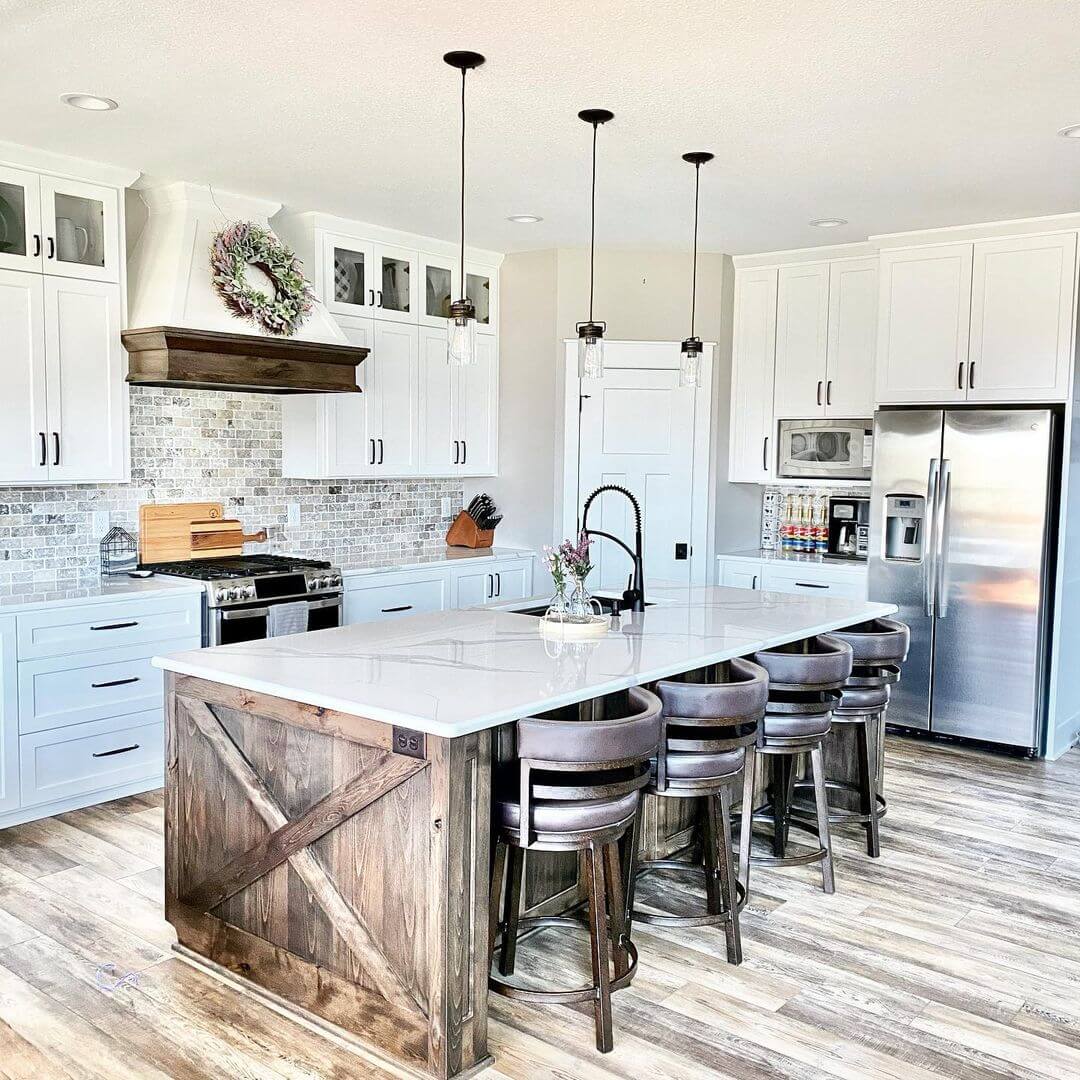
Granite Countertops – Pros
- Heat- and Scratch-Resistance – Even scalding hot pans don’t stand a chance against granite slabs. The surface won’t chip, scratch, or blister. However, it doesn’t hurt to use a trivet when setting down hot appliances.
- Natural Appearance – Good luck beating the look and feel of natural granite. Mother Nature can create quite a splash in the rock she created from millions of years of compression of various minerals. Granite designs can be phenomenal in their variety, richness, and artistry. The elegant material can enhance any bathroom or kitchen.
- Low Maintenance – You can set and forget your granite countertop. The durable exterior reduces maintenance needs to near zero. It only requires sealing every six to 24 months.
- Sustainability – When mining teams extract natural granite, the material resembles what ends up in your kitchen. Put another way, the rock needs minimal processing except for cutting and polishing. The low production requirements make it more sustainable than quartz.
Granite Countertops – Cons
- Moderately Porous – Natural granite has tiny pores that make the stone slightly prone to absorbing liquids and thus stains. As long as you wipe liquids before they seep into the cracks, your kitchen counter should remain stain-free. You can reduce the chance of discoloration by sealing the surface.
- More Expensive – Engineered stone countertops typically cost less than their natural counterparts. As a result, higher grades of granite carry a heftier price than engineered stone. There’s one exception: treated quartz costs more than regular granite.
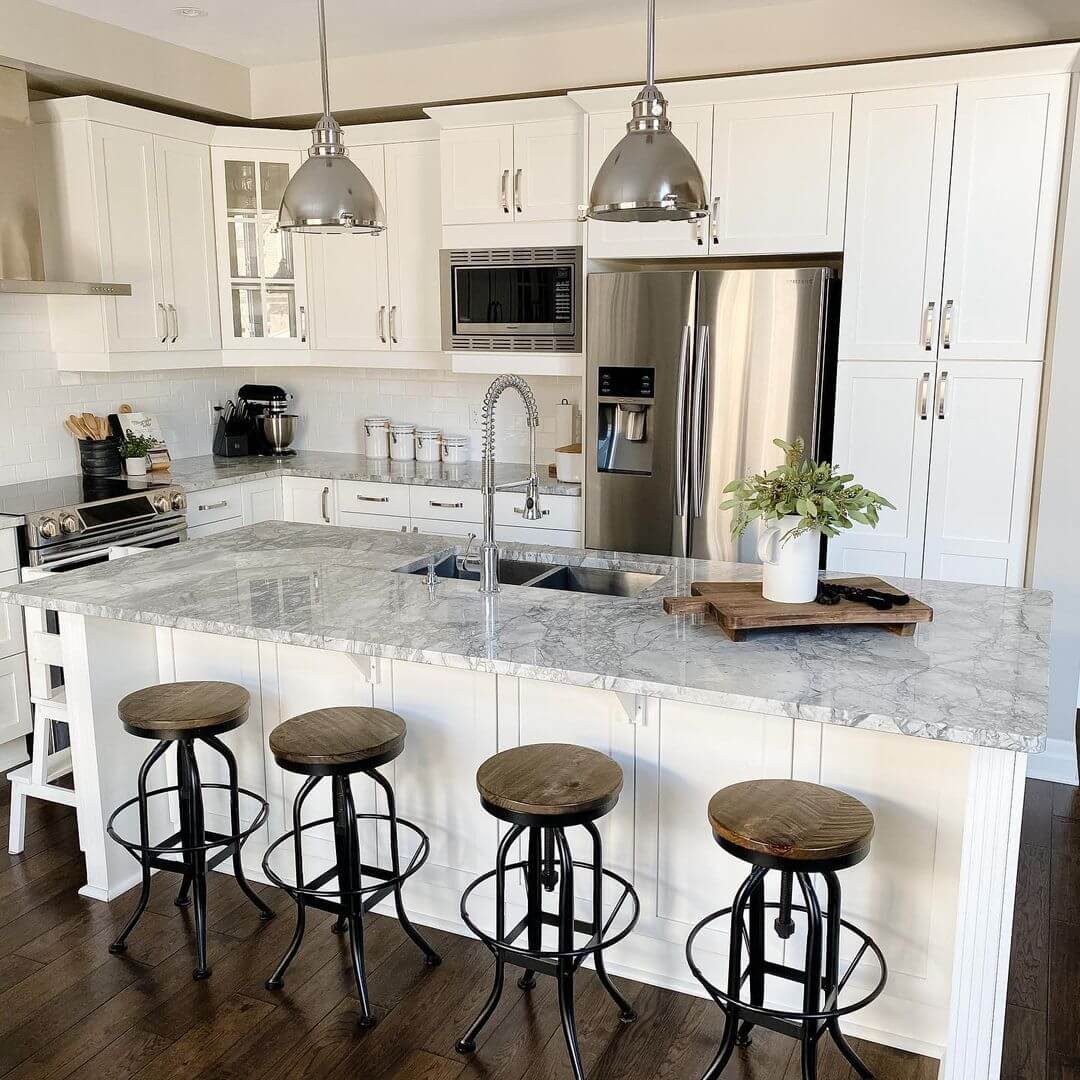
Granite vs. Quartz for Bathroom Countertops
You can’t go wrong with granite or quartz for your bathroom countertops. The two materials have exceptional durability, and each adds instant value to your home. Considering the appearance, maintenance, and cost of each option can make choosing between them more manageable.
Natural granite counters have a more distinctive look. Each slab has a singular, one-of-a-kind pattern with a mixture of hues in the grain. While a quartz countertop lacks the natural aesthetic of stone, it’s far from a deal-breaker for most people. Bathrooms don’t receive as much foot traffic as other rooms, so visual pop may not matter, plus the uniformity of a quartz design may look better on a smaller bathroom countertop.
Both countertop materials require minimal attention. However, the attention that you should give them varies. Quartz countertops are scratch-resistant but not scratch-proof. You may touch up any cracks or chips that appear over time.
Granite slabs can withstand high heat and hot pans that quartz cannot. If you damage the surface, though, you’ll have a more challenging time repairing the damage. Sealing the seams with resin can reduce the chances of unwanted chips or blemishes.
Resale value should factor into your home improvement decisions. Granite has a slightly stronger reputation than quartz. You’re more likely to recover your initial investment with a natural stone instead of its engineered peer.
Is Quartz or Granite Better for Bathroom Countertops?
Granite works better if you want a chic, natural appearance that will boost your home’s aesthetic appeal and overall value.
However, if you want a slightly more affordable and versatile option, you can’t go wrong with engineered stone. If push comes to shove, quartz gets the edge for bathroom countertops.
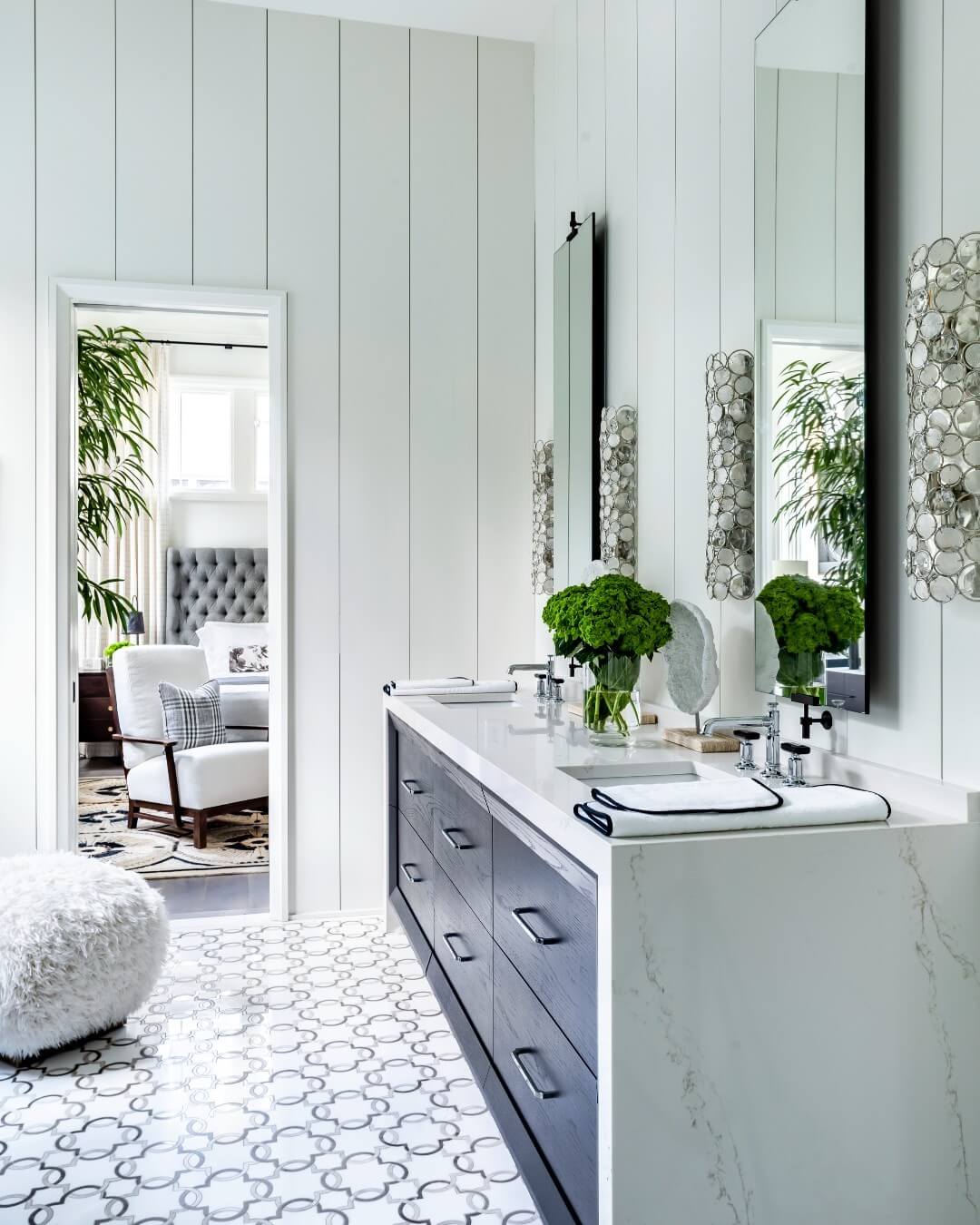
Granite vs. Quartz for Kitchen Countertops
Kitchen countertops need to withstand a range of elements, including heat and moisture. The best materials also complete your interior decor, tying together the visual components of the room. They serve as a focal point that provides an immediate return on investment for your home improvement project.
Granite has superior heat resistance. A quartz countertop doesn’t offer the same protection. Heat can discolor the resin (see more below).
While granite can handle the heat, it does not perform as well with moisture because its microscopic pores require you to seal the surface to prevent long-term damage. Quartz is more impenetrable to liquids and their damages.
Each countertop material has points in its favor, so the aesthetics of each may become the deciding factor. Granite has a timeless quality that rivals marble. It has become highly sought-after among new home buyers. The natural granite patterns in higher grades of granite also come in some dramatic colors and designs from different regions of the world.
Quartz countertops can never replicate the elegant patterns of natural granite. However, since quartz countertops consist of crushed quartz, producers can dye the manufactured rock any color, and quartz can sparkle, as well. The material also creates a more consistent appearance so that you can hide the seams easily.
Is Quartz or Granite Better for Kitchen Countertops?
You can go back and forth, weighing the pros and cons of granite and quartz for eons. Granite has an unmistakable aesthetic that adds more resale value to your home, while quartz allows for more personalization.
Ultimately, the durability and sophistication of granite make it the go-to choice for kitchen countertops.
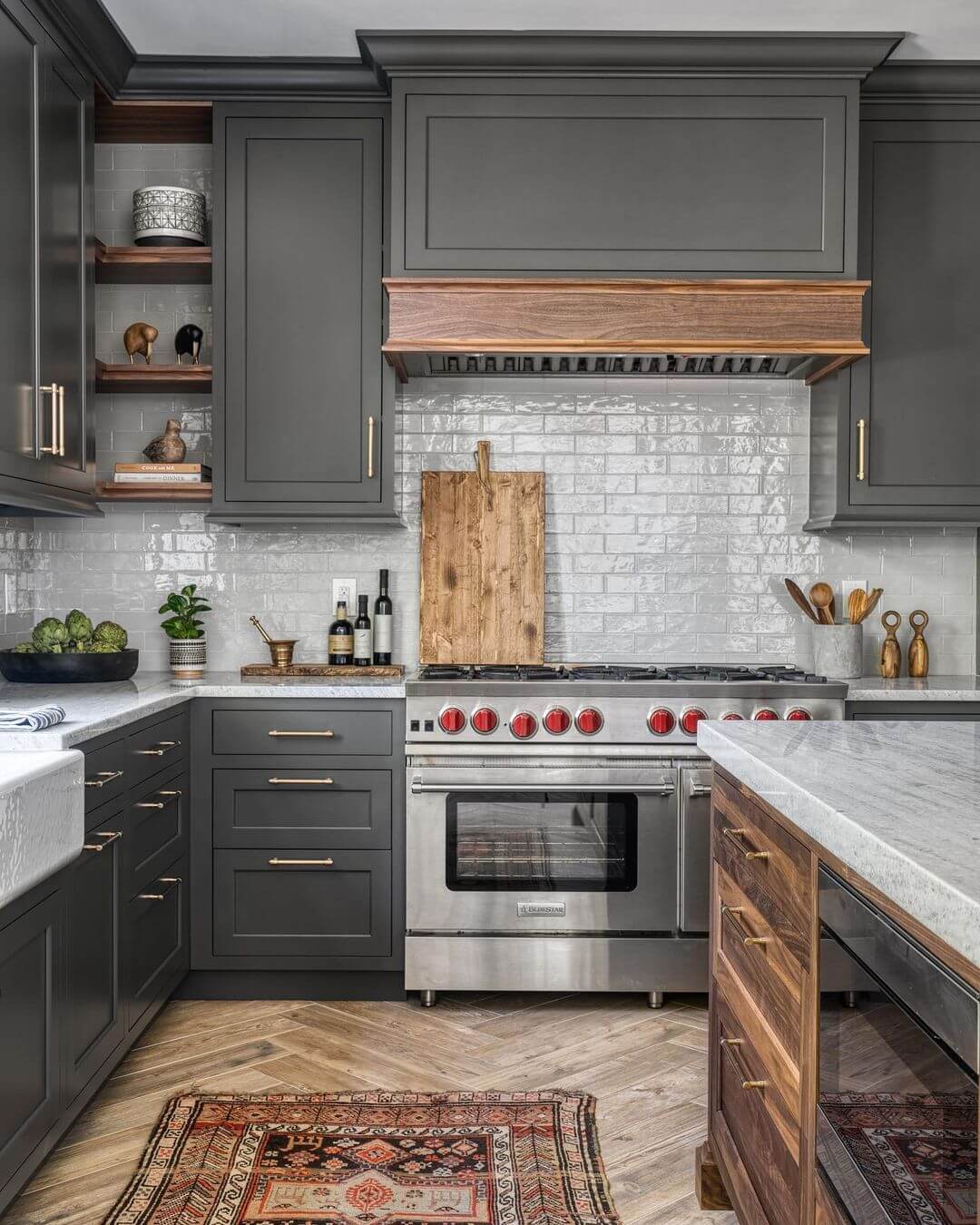
Granite vs. Quartz for Outdoor Kitchens
Many of the factors that influence granite and quartz countertops indoors also apply outdoors. Quartz makes up some ground in this head-to-head competition since it has superior water resistance. You should prioritize an outdoor kitchen countertop that can withstand moisture from the elements even if you live in perpetually sunny places like Southern California.
Let’s consider two additional factors: price and installation. As a rule of thumb, quartz counters cost less, and manufacturers can customize them to your desired specifications. Whether you need a custom edge or a specifically dyed resin, you can achieve a look and feel as unique as you are.
Granite stands out as the more cost-prohibitive material. The slabs sport a higher price tag, whether you want to apply granite tiles or overhaul the entire outdoor kitchen island. If you feel strongly about the stone’s patterns and style, you can justify investing in natural stone.
Both options come with installation challenges. Granite and quartz slabs weigh a figurative ton, so they’re not suitable for DIY construction. Using the proper equipment, contractors can deliver and install a single slab in two to four hours. More complex configurations will, of course, take longer.
Because of the weight, contractors may need to reinforce cabinets to ensure that the structure can support the countertop. Granite comes in pre-cut slabs that may require recutting in case of natural blemishes that need to be avoided.
Is Granite or Quartz Better for Outside?
Quartz and granite each have strong cases, but the edge goes to quartz countertops for outdoor kitchens.
The non-porous design makes it the better-suited option for outdoor weather environments as quartz is stain resistant. Plus a quartz countertop will most certainly take your BBQ area to another level.
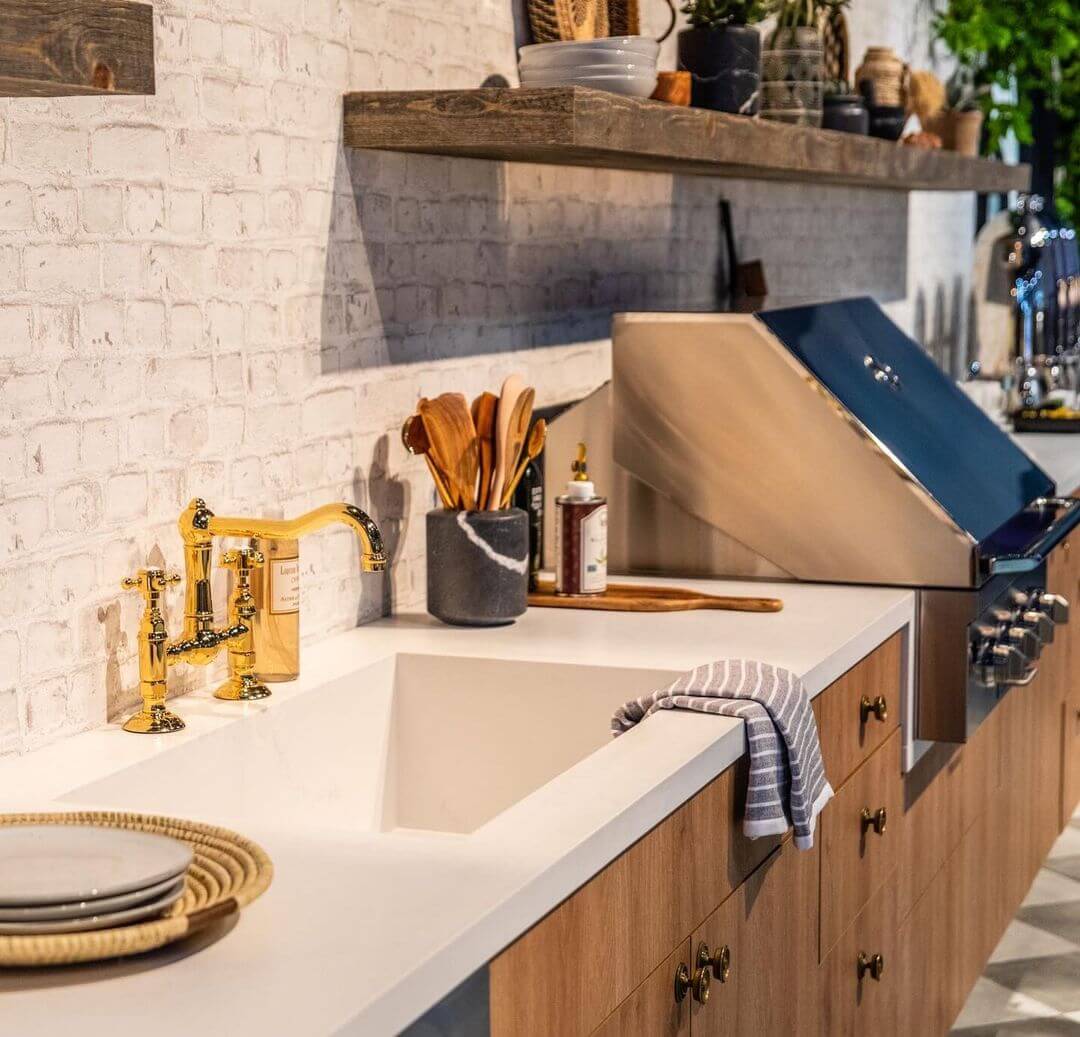
Granite and Quartz Sink Options
Quartz and granite have attractive qualities that make each of them valuable additions to any bathroom. In both cases, the best sinks are engineered and manufactured from composite materials rather than natural stone, mixing ground stone with resin, which makes them extremely durable.
Granite composite material for sinks is formulated to be resistant to chips and scratches. You can buy it in rich colors with more consistent patterns than natural granite, and it usually includes UV protection to keep it from fading over time.
Like quartz, engineered granite is relatively non-porous, which makes it more impenetrable. Granite sinks are heavier and have a harder surface than stainless steel or porcelain sinks.
If you’re dead-set on a natural stone look, you can make natural (rather than engineered) granite work as a sink. Proper sealing can prevent moisture from compromising the underlying material. If you choose this route, you must reseal the sink every few months to minimize water damage.
Water isn’t the only thing that can shorten your sink’s lifespan. Bacteria and scum can leave unsightly stains. If left untreated, these eyesores can diminish your home’s resale value.
Fortunately, you can clean both granite and quartz sinks with mild soap or detergent. Once cleaned, quartz reveals a vibrant sheen that brightens up the kitchen. While granite sinks don’t have the same luster, they hold up better if you have tough stains and need to use harsh chemicals.
Which Is Better: Quartz or Granite Sinks?
Both quartz and composite granite sinks offer a no-hassle way to upgrade your bathroom. The engineered materials won’t retain water, and you don’t need to reseal them every few months.
Plus, you can wipe away stubborn marks from shampoo, soap scum, and toothpaste with a wet microfiber cloth.
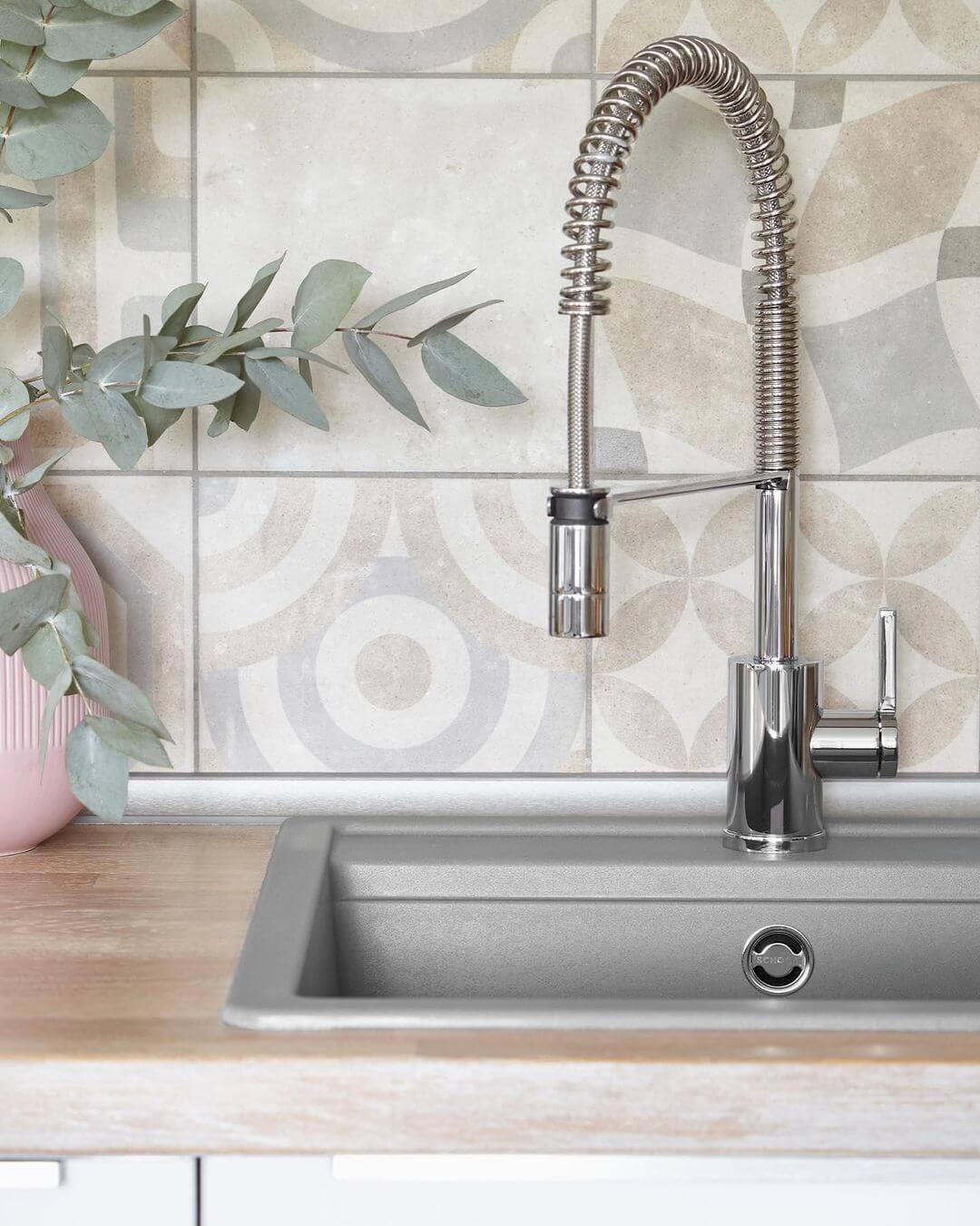
Quartz Composite Sink Problems
Many homeowners opt for light-colored sinks because dark patterns fade with time. They are also more prone to scrapes and scratches, which require additional maintenance.
While white quartz sinks cost slightly more than earth-toned ones, it’s worth paying more for the upgrade.
Because of its hardness, quartz proves unforgiving with dishes and glasses, too. If you accidentally drop something while cleaning, there’s a high chance of the object breaking. The same is true of engineered granite sinks. Some people prefer stainless steel sinks to mitigate this risk.
Granite Composite Sink Problems
Granite composite sinks have more pros than cons. However, you should still consider the potential problems. For instance, installing a granite composite sink may cost more than competing models.
If you have a tight budget for your bathroom or kitchen renovation, this fact may prove a breaking point.
The sink also requires more maintenance to prevent water damage. That’s because lighter-colored sinks tend to stain more easily. Waterborne minerals can cause the colors to fade without proper protection.
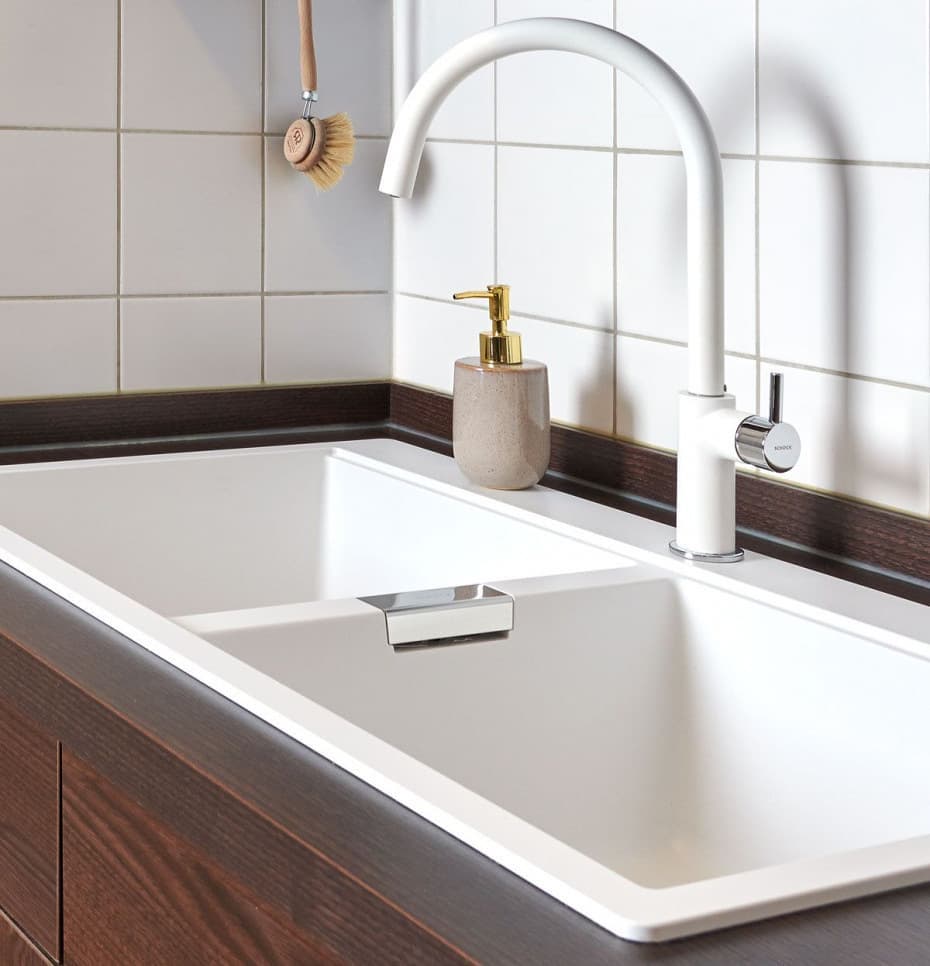
Granite vs. Quartz Heat Resistance
Is Quartz or Granite More Heat-Resistant?
Nothing in your home can burn granite. Its dense composition makes it resistant to heat from curling irons, pots, and trays. Experts estimate that it can withstand temperatures as high as 1,200 degrees.
However, you should avoid placing hot items in the same place as cold ones on your granite countertop. For example, putting a bowl of ice water next to a boiling pot may cause undue stress. Granite won’t crack under day-to-day use, but these atypical cases can erode this otherwise durable material.
Quartz countertops don’t have the same durability as their natural stone counterparts. You may notice visible damage from objects starting at 150 degrees. Extreme heat may contribute to discoloration and stains in the countertop material.
How to Protect Quartz Countertops from Heat
Anyone with a quartz countertop should invest in a trivet. Always keep one nearby when you make a meal. Hot pans can create blisters that even the most skilled contractors can’t remove.
These handy kitchen gadgets provide a safe place to put sizzling dishes and spare you the headache of expensive repairs. A burn or stain on your quartz countertop can set you back hundreds of dollars if you don’t use a trivet.
Can You Put Hot Pans on Granite?
You’re not going to burn granite unless you have a welding torch in your kitchen. Even putting the stone under an active flame won’t cause damage. Granite’s melting point is 22,100 degrees, roughly seven times the temperature you cook your steak.
So, what makes granite countertops borderline invincible? The answer lies in their formation. Granite slabs are a type of igneous rock that only forms under extreme heat. When the material cools, the stone becomes ultra-hard and dense. This complexion gives it robust heat resistance, making it an asset in the kitchen.
Granite vs. Quartz Countertops Maintenance
Is Granite or Quartz Easier to Maintain?
Granite and quartz have earned reputations for their beauty and durability. However, these premium materials have different maintenance needs. These discrepancies can affect how much time you spend on kitchen repairs and cleaning.
The advantage of quartz is that you never need to seal it. In fact, sealing may cause damage to your kitchen counter. On the other hand, you need to seal granite regularly to keep it in tip-top shape.
Quartz’s engineered origins contribute to its low-maintenance characteristics. The manufactured material contains natural quartz, which ranks as one of the toughest minerals on earth. Manufacturers combine the substance with polymer resins and dyes to produce strong and stunning countertops.
Caring for Your Quartz Countertops
Being impervious to liquid damage, you won’t have to worry about your quartz countertops harboring unwanted viruses, germs, and bacteria. If you need to clean the quartz surface, you should use mild soap or detergent instead of harsh chemicals. Many household cleaners contribute to fading and wear.
Soap and water are all you need to keep your quartz countertop spotless. Use dish soap or detergent if you have to clean a larger mess. The liquid pools on the counter, preventing it from soaking into the pores or seams.
Whatever you do, avoid using harsh chemicals on quartz counters. Household cleaners with high or low pH levels can discolor the engineered stone. You should also avoid abrasive cleaners like metallic scouring pads and scrub sponges since they can cause fading.
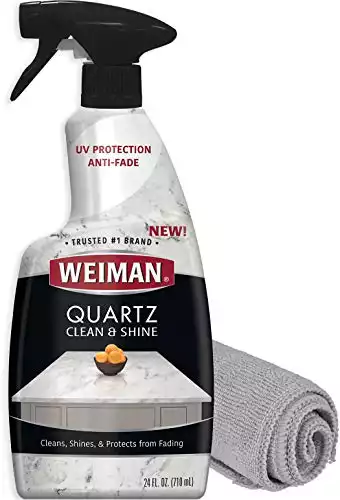 Weiman Quartz Countertop Cleaner and Polish Combo
Weiman Quartz Countertop Cleaner and Polish Combo
- An excellent low-cost cleaner and polisher for quartz countertops offering lasting UV protection to help prevent fading or darkening.
- Utilizing a pH-neutral formula that cleans, protects, and shines, all while removing nasty-looking surface stains and watermarks.
- With regular applications, this cleaner and polisher will help revitalize your lackluster-looking kitchen countertop to previous prestige.
- Has been specifically formulated for quartz countertops made without the use of harsh chemicals, so no unpleasant after fragrance.
Caring for Your Granite Countertops
Even though granite is slightly porous, it has low maintenance requirements. A little bit of work to seal it occasionally can keep your counter in excellent condition for decades. This process is critical if you have a white or beige countertop since they discolor much more easily than darker colors.
Understanding the do’s and don’ts of granite maintenance can make a world of difference for your countertops. Start by sealing the surface every six to 24 months. You have three primary sealant options: topical sealers, penetrating sealers, and stone enhancers.
Sealants can protect your countertop from bacteria, viruses, and germs. Avoid letting bacteria-laden juices from raw meats soak into your countertops for health reasons, and avoid juices from dark fruits or vegetables, like berries or beets, which can leave permanent stains. Wipe up spills as soon as they happen to minimize potential damage.
You can use strong household cleaners on granite if you have a tough-to-remove mess. The stone holds up against abrasion. Some companies manufacture products specially designed for cleaning granite.
 TriNova Granite Care Daily Cleaning & Granite Sealer Bundle
TriNova Granite Care Daily Cleaning & Granite Sealer Bundle
- Professional strength cleaner and sealer that is pH-neutral so it won't damage your expensive granite countertops sealant.
- A renowned cleaner and sealer combination that will revitalize your existing countertop for an attractive streak-free finish.
- Sealer using an advanced blend of polymers to provide lasting protection against stains penetrating the surface of your countertop.
- Low maintenance sealer with a 1 hour cure time so that your countertops are fully protected from harmful contaminants and stains, pronto!
Which Is More Scratch-Resistant: Quartz or Granite?
Quartz and granite have comparable levels of scratch resistance. You’re unlikely to find chips or scrapes, regardless of which one you buy. Even if you run the edge of a knife along the top of your counter, you likely won’t make a scratch.
You can see this durability in the Mohs scale. A German mineralogist named Friedrich Mohs invented the ten-point system to measure an object’s hardness.
Quartz scored a seven on the Mohs scale, while granite ranked between six and seven. For comparison, marble only scored a four out of ten, and diamonds earned a ten.
If you had only to choose one material for its scratch resistance, quartz would get the edge. Here are the two main reasons why quartz takes the cake in that department.
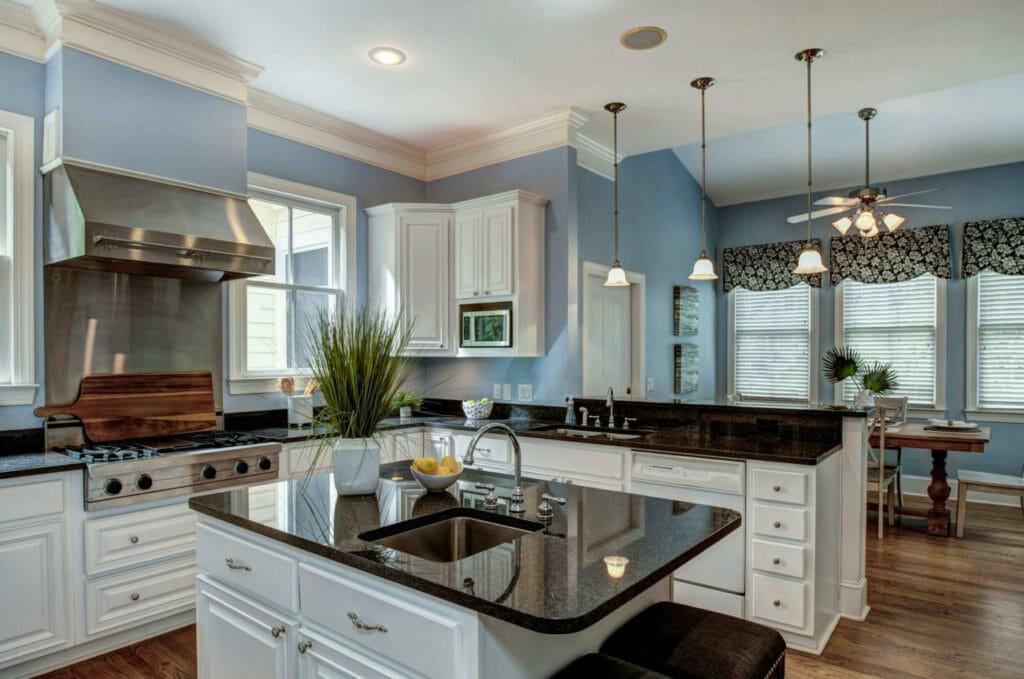
Which Is More Expensive: Granite vs. Quartz?
Prices generally include installation in addition to the material itself. Natural stone granite and man-made quartz countertops have similar base prices on a per square foot basis. Granite has a broader variance in price and can cost more, depending on its colors and patterns.
Quartz countertops become more expensive based on a number of factors, most notably the grade of the quartz material but also the complexity of the counter shape (number of seams, corners, cut-outs, and type of edges to be cut) and installation.
The four grades range from the top-level designer (which may be custom-made for a particular client) to premium, standard, and closeout or clearance (discontinued).
Standard-grade quartz slabs are usually limited in color tones to earth tones and are most often plain in their patterns. Premium quartz slabs may have richer colors and more enhanced designs.
Why is Granite More Expensive Than Quartz?
The most expensive granite kitchen countertop will always cost more than the most expensive quartz.
Each granite kitchen countertop comes from a unique slab of rock that’s impossible to replicate. Slabs with various colors, patterning, and veining, such as Van Gogh Granite or Andromeda, rank among the most coveted countertop materials in the industry.
Granite slabs in darker colors with consistent patterns are usually the least expensive. Like man-made quartz, granite is also graded. Factors affecting the natural granite grade include:
If you want to save money on natural stone, buy a granite slab from a wholesaler. You can save hundreds of dollars on remnant pieces, as well, if you only have the need for small pieces like a washroom vanity.
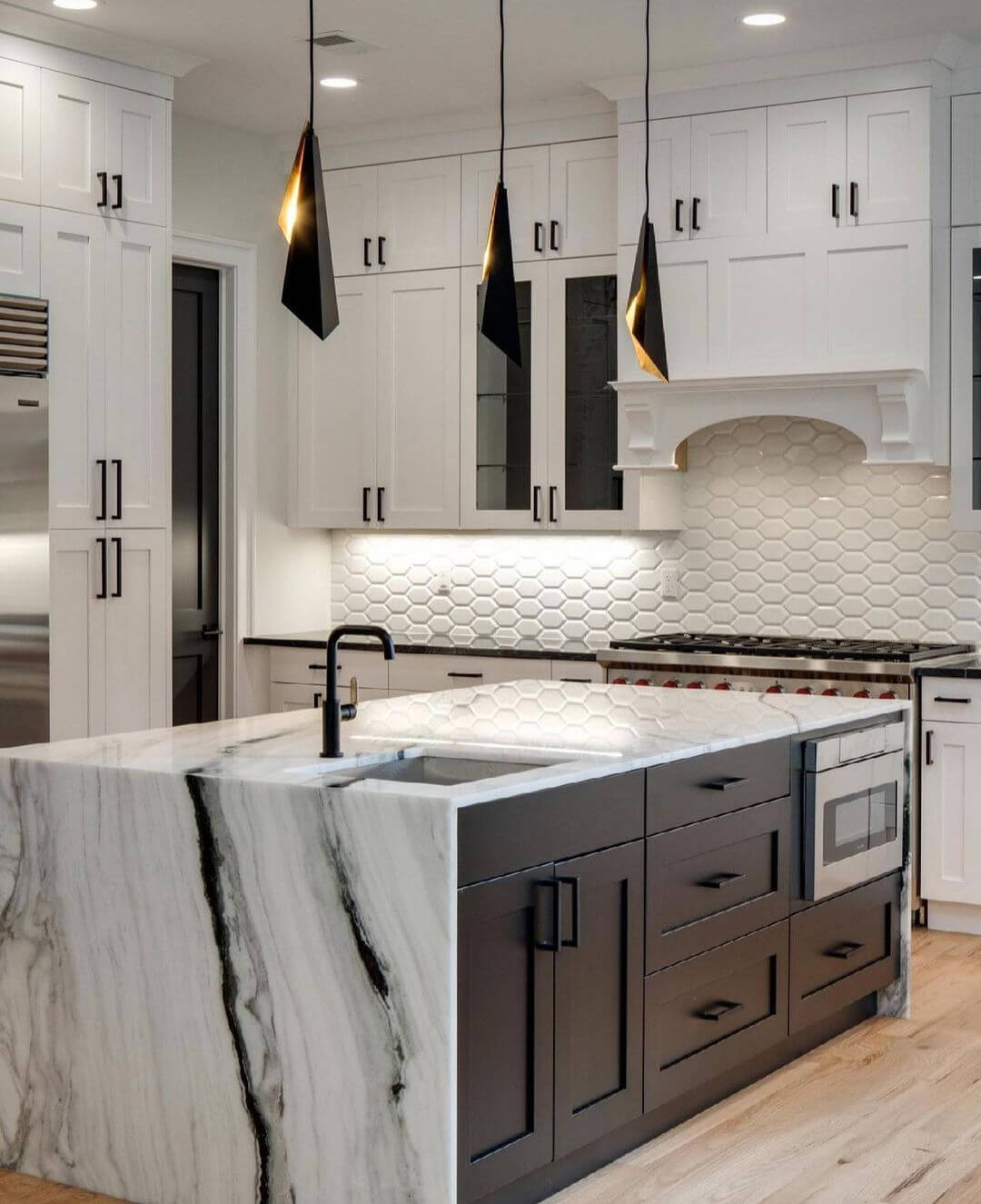
Granite vs. Quartz Installation Cost
Cost of Granite Countertops Installed
A granite kitchen counter costs $30 to $200 per square foot, including installation. The cost depends on several factors, including the type of granite and the complexity of the cutting necessary to create and install the countertops. Rare granite costs more than standard versions of the stone.
Choosing granite tiles over solid slabs can help you save on installation costs. Contractors can place the tiles over the existing countertop, which eliminates the need for demolition and disposal.
If you want something between a slab or tile countertop, consider a modular. These miniature slabs fit together to form a singular piece. The option costs less than a slab and has more DIY project potential.
Cost of Quartz Countertops Installed
Quartz countertops will set you back $45 to $130 per square foot, including installation. The final price can vary depending on the treatment and style.
For instance, Cambria and Calacatta Naples quartz cost more than other options. They have elegant and milky complexions with flowing veins that add aesthetic flair to the countertop.
Expect to pay $4,500-$12,000 to install new quartz countertops for a modern kitchen. If you choose a budget-friendly renovation or have a small kitchen or bathroom, you may be able to keep the overall price down to $1,500.
Granite vs. Quartz for Resale Value
Every home renovation project impacts your house’s resale value. The best ones can enhance your kitchen or powder room while making the property more enticing to potential buyers.
High-quality granite and quartz countertops will last for decades, so future owners don’t have to worry about routine repairs.
Remodeling can also help you secure more competitive loans. The higher your home’s appraised value, the more equity you have. You can even use the right upgrade to cancel your private mortgage insurance payments if you’re a first-time homebuyer.
What Has Better Resale Value, Granite or Quartz?
If you want to maximize the return on investment from your countertops, granite has the edge. It has more cachet and higher demand among homebuyers. Up until the 1980s, granite and marble were considered too expensive for the average homeowner.
That changed thanks to graphic designer Deborah Sussman, who sparked a trend for unique stone countertops.
The 1990s marked a shift in granite production. Quarries began mining, refining, and cutting granite at lower prices. This revolution led to an increase in production and lower costs for consumers. The granite counters that were once reserved for the rich and famous were now available to the masses.
Investing in granite makes sense based on the other houses in your neighborhood. If other homes have granite or marble, you should consider installing the same countertop material. When you need to list your estate on the open market, you’ll have a competitive property.
If similar homes don’t have granite counters, you should opt for quartz. Recovering the cost of the remodeling be harder without the neighboring competition. Modern counters justify a higher price, but if that puts your property far above other listings in your neighborhood, your home may be harder to sell.
How Much Value Do Quartz Countertops Add to a Home?
Yes, quartz countertops can add value to your home. How much value? That answer depends on several factors, including:
Other houses in your area serve as a litmus test. You should remodel your countertop if it puts your estate on par with similarly priced homes. You can say “no” to crushed quartz if the investment doesn’t provide the desired return.
While granite stands out as the “classier” countertop material, quartz has strong selling points of its own. The easy-to-maintain surface proves a selling point to any homebuyer who doesn’t enjoy cleaning.
Additionally, new homeowners don’t have to reseal the manufactured countertop.
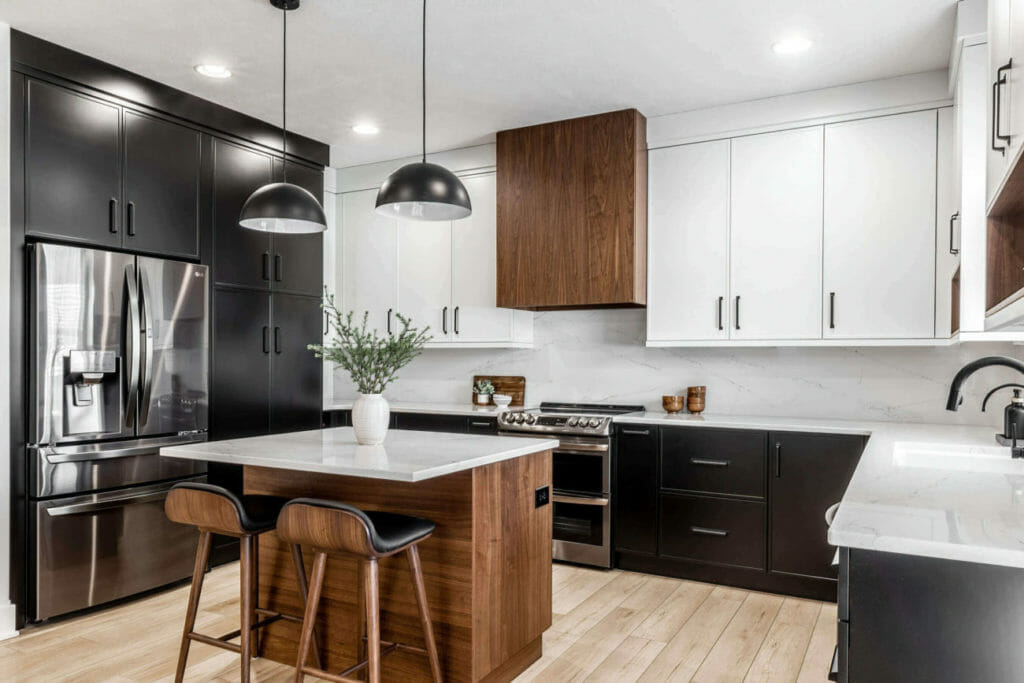
Granite vs. Quartz for Rental Property
Granite and quartz can bolster your rental property’s value. Before you take a sledgehammer to your countertop, take a look at the local housing market. It can serve as a barometer to decide between quartz and granite.
For example, if you have a property in an upscale neighborhood, many of your neighbors have granite or marble countertops. Quartz and ceramic tiles may be in the minority. In this case, remodeling with granite makes sense. An elegant slab with lush white veins can make your property more desirable.
Engineered, non-porous stone works better for other situations. Perhaps you’re leasing the place to college students or first-time renters. Quartz ensures that the tenants will have a sturdy kitchen counter with a surface that accents the home decor.
The Bottom Line
Whether you want to renovate the washroom, bar, kitchen, or even outdoor kitchen, you can find a material that fits your needs and budget.
Key Takeaways:
As we’ve shown in this article, there’s no one-size-fits-all answer when deciding on quartz vs. granite. Granite and quartz countertops each have a distinctive set of pros and cons. Choosing a suitable material depends on your budget, preferences, needs, and even home decor.

